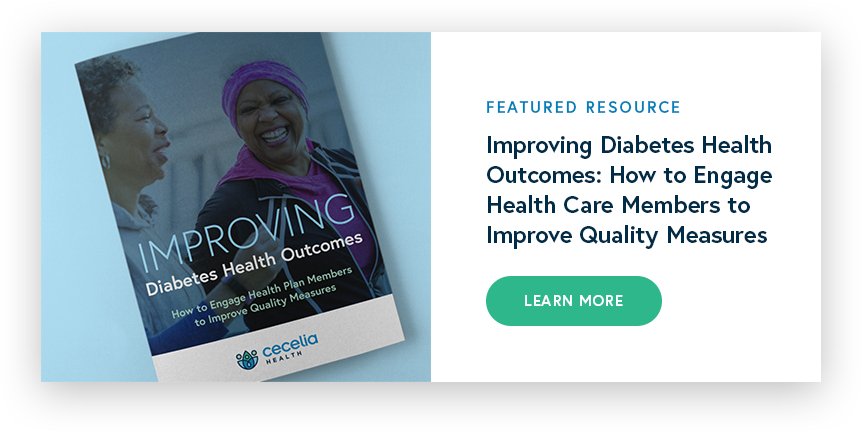If you run a diabetes care service, you know just how important driving measurable health improvements is. But improving health outcomes and quality measures might be more complicated than it seems, especially for high-risk and poorly controlled populations.
Achieving the results that you and your patients want requires a holistic approach. Is your existing program meeting the true needs of your patients?
To be truly effective and impactful, member engagement programs must focus on the following 5 key areas.
Changing Lifestyles
Living well with a chronic disease like diabetes is possible but requires some lifestyle changes to keep members in good health. Although medical help has vastly improved over the past few decades, 90% of chronic disease management occurs outside of the acute care setting.
With that in mind, helping members to lead more active lifestyles and eat healthily is not just about losing weight, but about the effect that exercise has on regulating blood sugar levels. Encouraging members to form better habits in monitoring blood sugar levels helps them understand vital information about their bodies and take responsibility for their disease management.
By shaping your program to help members change their lifestyles, you improve patient self-efficacy and health outcomes by increasing the patient’s knowledge, attitude, and behaviors.
A1C Reduction
For your members to maintain healthy lives, A1C reduction is a powerful metric to target. Studies have shown that lowering A1C levels slows the progression of diabetes and reduces the risk of complications — such as nerve damage and cardiovascular disease — in both type 1 and type 2 diabetes.
Even small changes in A1C levels can have significant effects. A 1-point reduction in A1C:
- Reduces the rate of heart attack, stroke, or risk of death from cardiovascular causes by 57%
- Reduces the risk of kidney disease by 50%
- Reduces the risk of eye disease by 76%
The American Diabetes Association recommends keeping A1C levels below 7 percent.
Medication Adherence
Medication adherence is a prominent barrier to better program outcomes. So for your program to be effective, your program must support members’ medical adherence.
Scientific research shows that the reported incidence of poor medication adherence in patients with type 2 diabetes, for example, range widely from 38% to 93% depending on the specific study’s methodological approach.
A member may not commit to medical adherence for numerous reasons. They might have misconceptions about their disease, a fear of administering their medication or monitoring their blood sugar levels, or misunderstandings about their medication and how it works. Recommended medications, including insulin, aspirin, blood pressure medications, and cholesterol-lowering medications reduce risks of complications.
Closing Gaps in Preventive Care
Diabetes often gives rise to other health complications, like cardiovascular disease, neuropathy, nephropathy, retinopathy, foot damage, skin conditions, and hearing impairment. Instead of only addressing problems when they arise, preventative care anticipates and addresses these problems before the complications become more difficult or costly to treat.
Yet, many patients may lack access to this care for a wide variety of reasons. Without proper preventative care, programs and organizations have lower HEDIS measures for eye, kidney, and blood pressure exam requirements. Closing this care gap is an essential step to creating an effective care program.
Improving Self-Management Confidence
Improving members’ self-management confidence is a keystone factor in your diabetes care service, and is often overlooked. Patients are not numbers or data points — they’re human beings with emotions and experiences. Confidence in their own perceived abilities to manage their disease can greatly impact the results of your service.
For example, low health literacy or a language barrier with a care provider can not only lead to a lack of understanding of the importance of self-management and the steps needed to ensure positive health outcomes, but also be a detriment to the patient’s confidence in managing their disease. This, in turn, may cause members to feel as though they don’t have the agency or skills to take care of themselves, which causes worse outcomes for your program.
Unsurprisingly, effectively helping members drive these core behavior changes requires personalized, one-on-one support. Despite education initiatives and care plans in place, even the most committed individuals find it tough to adopt and adhere to a self-care regimen.
We proactively target these challenges at Cecelia Health with our Certified Diabetes Educator (CDEs) coaching program. We combine the individualized coaching of an expert clinician with proprietary technology to deliver a personalized coaching program to improve self-management and drive behavior change in your members. Learn more about our proven approach with proven results.

